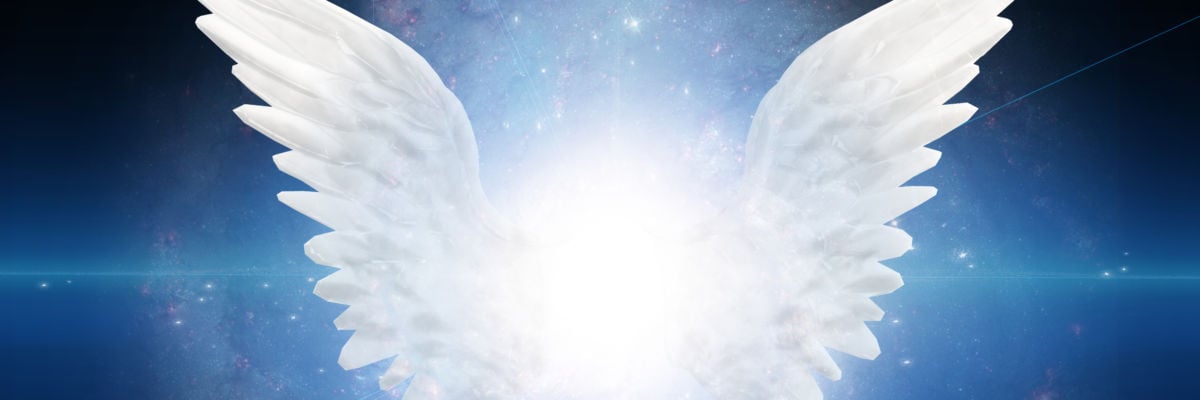
It’s something of a paradox that, in recent years, as it seemed the Church spoke less about angels, popular culture got interested in them all the more. Even in today’s bookstores (if those institutions still exist), if they have a “Religion and Spirituality” section, it’s likely there’s going to be some “angel” titles.
The problem is that the saccharine schlock that passes for “angelology”—especially in New Age versions—has nothing in common with the real McCoy. So let’s talk about the latter.
First of all, angels exist. That is a Catholic truth. The Catechism (328) says this is witnessed by Scripture and Tradition. The Bible mentions them frequently, and Catholic tradition has both spoken of and encouraged devotion to them.
We affirm that truth every Sunday when we make the profession of faith. “I believe in God . . . Creator of all things . . . visible and invisible.” What are those “invisible” realities? Not God, because he is Creator, not creature. Not heaven or hell, because they are first of all states—i.e., conditions of being resulting from our moral choices vis-à-vis God—not places. “Invisible” created beings are angels. (This is one reason why the 2011 retranslation of the Creed occurred. Things “seen and unseen” depends on the acuity of your eye; invisibility is already beyond its capacity.)
The existence of angels appears to be affirmed in Catholic teaching: the Catechism (327) quotes the Fourth Lateran Council that God created a “spiritual and a corporeal” creation, with man having a foot in both orders.
(Philosophers even call the opposite error of materialism [that man is but matter] angelism, the false idea that man is really just spiritual, with a body attached.)
Angelic existence even makes basic philosophic sense. We recognize that there is an order or hierarchy in being. Animate beings are more important than inanimate ones—e.g., flowers beat rocks. Mobile animate beings trump immobile ones—e.g., rabbits over roses. Rational bodily animals surpass non-rational ones—i.e., Sam and Sarah should be rescued from a fire before a sheep (Peter Singer’s advice notwithstanding). So, between Uncreated Personal Spirit (the Triune God) and spiritual-corporeal persons (man), why shouldn’t there be spiritual-non-corporeal persons (angels)?
One reason why I suspect that some doubt about angels is found, especially among ’70s- and ’80s-vintage theologians, is more their problem with fallen angels. In their rush to dismiss the devil as a “myth,” “illusion,” or “symbol of evil,” they had to get rid of the angels who didn’t fall, too. Hence, angels became “manifestations of God,” falsely conflating the messenger (because that is what angel means: “messenger”) with the Message, indeed, the Word (John 1:1).
Second, as persons (i.e., rational beings), the angels also have freedom. Some chose to use freedom for good, some for evil. The Bible (Rev. 12:7-12) speaks of a “great battle in heaven” between Michael the archangel and “that great dragon, Satan.” The latter was cast out of heaven, or really cast himself out because, in his pride, heaven couldn’t fit God and him.
(Because the spiritual angelic mind “knows” things differently from how we bodily-spiritual creatures, dependent on the senses, do, their choice was one time and irrevocable. Seeing everything their choice entitled, some still chose “to reign in hell rather than to serve in heaven.” Such is the seductive mystery of evil.)
Third, biblical witness to the angels is strong. St. Gabriel the Archangel clearly gets the most prominent press, as he announces the conception of John the Baptist and invites Mary’s fiat to be Mother of God (see Luke 1). Joseph also gets his share of angelic visits (in dreams, e.g. Matt. 1:20), and although the angelic messenger is unnamed, his message sounds a lot like Gabriel’s.
Michael is mentioned primarily in terms of God’s judgment: he is the victor who, by the power of God, puts down the Satanic rebellion, and he regularly features—in both the Old (Dan. 10:13,21; 12:1) and New (Rev 12:7-9, Jude 1:9) Testaments—in God’s judgment of man and the world. It’s for this reason that the Leonine “St. Michael Prayer” that has seen a renaissance in some parishes invokes Michael to defend the Church against diabolic assault and to “cast into hell” the rebels.
St. Raphael is the least known of the three. His name means “God has healed,” and he features prominently in that role in the Old Testament Book of Tobit, both in terms of healing Tobit’s blind father (11:7-16) and in driving off a devil who had besieged the woman Tobit sought to marry (chs. 6-9).
Fourth, the Church has long affirmed God’s gift of “guardian angels”—an angelic companion for every human being through the journey of life. God wills the salvation of all. Archangels might get top biblical billing in high moments of salvation history (e.g., the Annunciation), but the angels are not just heavenly courtiers. As God’s messengers, they work with him to accomplish his will, which is to say our salvation.
Perhaps the Deist caricature of God sees the universe as a wind-up clock running by itself, its “God” off on vacation somewhere, leaving isolated individuals to their druthers to “work out their salvation in fear and trembling.” Our God’s mercy is expressed in Providence, in a proactive care for his creatures, at whose apex in the visible world stands man. If God thinks so much of man as to make him in his “image and likeness” (Gen 1:26-28, which many theologians think is what drove Satan into rebellion), why would he not wish to “give His angels charge over you, to guard you in all your ways; to bear you up on their hands, lest you strike your foot against a [spiritual] stone” (Ps. 91:11-12; see also CCC 336)?
Devotion to your guardian angel is not childish; it is a sober awareness of what you’re up against and the extraordinary resources God puts at your side.
The feast of Ss. Michael, Gabriel, and Raphael is September 29; the Memorial of the Guardian Angels falls just three days later, on October 2.
Angel of God, my guardian dear
to whom God’s Love entrusts me here
ever this day be at my side
to light and guard, to rule and guide, Amen.



